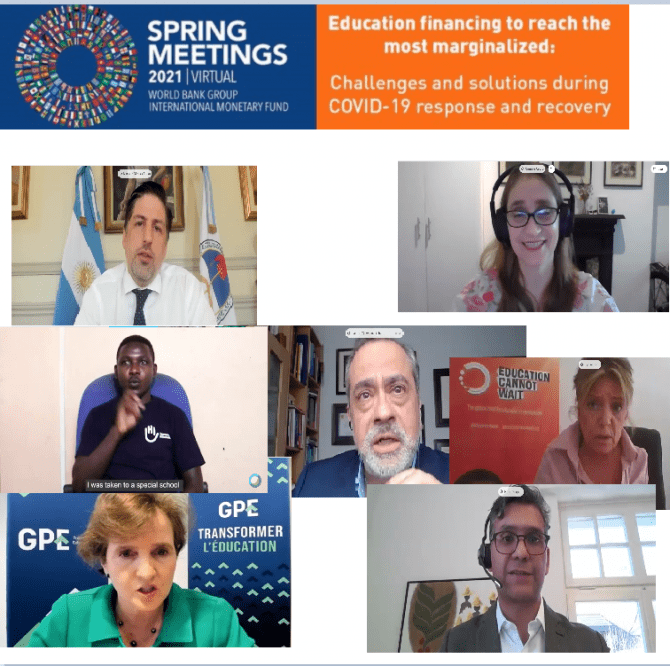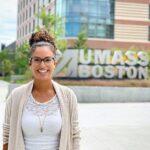Education Financing to Reach the Most Marginalized: Challenges & Solutions during COVID-19 Response

The COVID-19 pandemic has impacted the education of over one billion people, including many of our most marginalized being impacted the most; this includes–but is not limited to: girls, children with disabilities, and children in conflict settings. Many of these children already faced challenges to access quality, inclusive education prior to the pandemic, which has now exacerbated these problems. On March 31, we co-hosted an event, in conjunction with the Civil Society Policy Forum during the World Bank/IMF Spring Meetings, that discussed the issue of education financing during COVID-19 response and recovery to reach the most marginalized.
The event was moderated and led by Camilla Croso, Director of Education at Open Society Foundations with introductory remarks by Vernor Muñoz, Head of Policy, Advocacy and Campaigns at the Global Campaign for Education. The high-level panel comprised of: Nicolas Trotta, Minister of Education, Argentina; Alice Albright, CEO, Global Partnership for Education; Yasmine Sherif, Executive Director, Education Cannot Wait; Fabio Segura, Co-CEO, Jacobs Foundation; and Jaime Saavedra, Global Director for Education, World Bank.
The discussion focused on the current needs for increased funding in educational systems across the world, as two-thirds of low and middle-income countries are reducing their budgets to finance education. Some solutions discussed during the event were: conditional cash transfer programs for girls and refugees to go back to or stay in school and Argentina’s effort to create public policies that will help to invest at national and subnational levels to make education the platform for justice and equity. The Global Partnership for Education highlighted the need to boost international aid for education, which has been stagnant since 2010; and Education Cannot Wait focused on the need to work with local communities to make objective assessments in collaboration with local governments. Jacobs Foundation discussed ways to encourage more investments in education to make up global learning losses due to COVID-19 and advance progress on Sustainable Development Goal 4.
Many of the solutions presented in the meeting have already shown promising results, and it is time for us as a global community to continue to push to finance education and build an educational system that is more equitable and inclusive than it was prior to the current pandemic.
To watch the video of the event, click here.
Stephanie Peña (she/her) is an Inclusive Education Coordinator at the Global Campaign for Education-US and Ph.D. student at the University of Massachusetts, Boston. Previously, Stephanie was a Research Assistant for Inclusive Development Partners, working with USAID. Prior to beginning her doctoral program, Stephanie served as a US Peace Corps Response Volunteer in the Eastern Caribbean where she partnered with the Special Education sector within the Ministry of Education in Grenada. She spent the majority of her service with local special education schools providing literacy training for teachers, reading assessments for students, and creating parent support groups for families. Prior to her Peace Corps service, she worked as a Regional Inclusion Coordinator in New York City with community organizations dedicated to the inclusion of children with disabilities throughout Manhattan and the Bronx. Stephanie is a Ronald E. McNair Scholar from the University of Washington where she received her Bachelor’s degree in Gender, Women & Interdisciplinary Studies. She has since received her Master’s degree in International Educational Development from Teachers College, Columbia University, where she was a Research Fellow for the YCAB Foundation in Jakarta, Indonesia.

